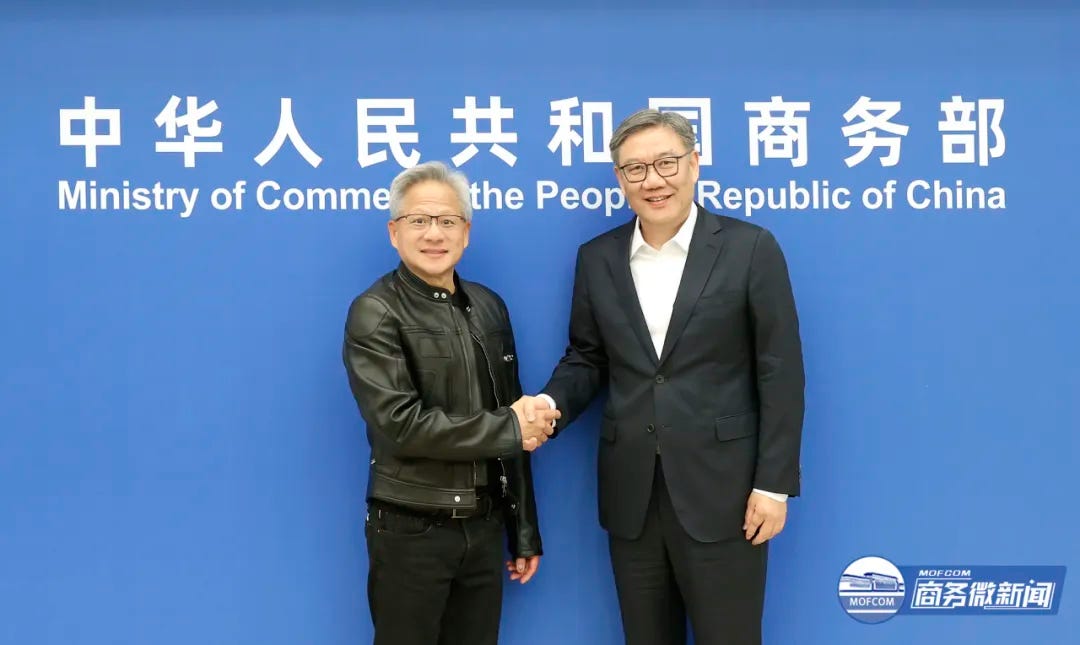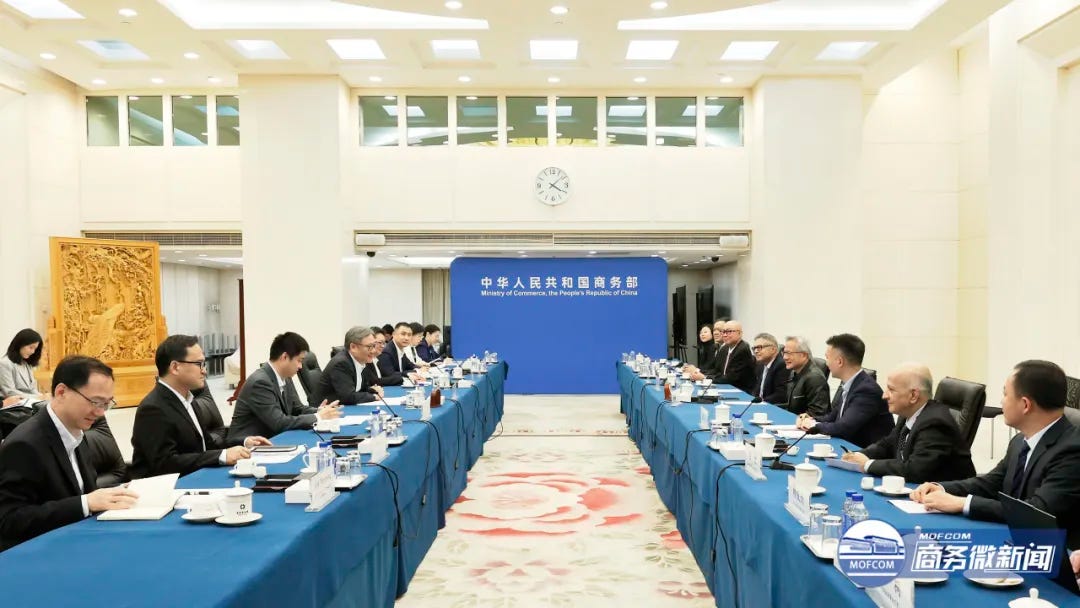The third day of Jensen Huang’s visit to Beijing, China’s MOFCOM clarified that the U.S. lifted H20 export ban at own initiative
On the third day of his visit to China, Jensen Huang met with two key figures: Chinese Minister of Commerce Wang Wentao and Yan Junjie, founder of MiniMax, one of China’s rising AI startups.
Minister Wang Wentao Meets with Jensen Huang, President and CEO of U.S. Company NVIDIA
On July 17, Minister Wang Wentao held a meeting with Jensen Huang, President and CEO of U.S. chipmaker NVIDIA.
Wang emphasized that China’s policy of attracting foreign investment remains unchanged and that the country’s doors will only open wider. He highlighted China’s massive market size, diverse application scenarios, and vibrant innovation landscape, expressing hope that multinationals like NVIDIA will continue to provide high-quality and reliable products and services to Chinese customers.
Jensen Huang responded by saying that the Chinese market is highly attractive, and NVIDIA is committed to deepening cooperation with its Chinese partners in the field of artificial intelligence.
The meeting between Huang and Yan Junjie, founder of MiniMax, was first reported exclusively by Tencent Tech, a tech media outlet under Tencent, which described the two as having had a “deep two-hour conversation.” However, that report was mysteriously deleted the following day.
Following his well-publicized meeting with Xiaomi’s Lei Jun, Huang also had a private discussion with MiniMax’s Yan Junjie, which reportedly lasted nearly two hours.
According to a July 18 exclusive from Tencent Tech, after attending the Chain Expo, Jensen Huang met with Yan Junjie at the Mandarin Oriental Hotel in Qianmen, where Huang was staying during his visit. The hotel setting matched the background of his earlier meeting with Lei Jun on July 14, also covered by Tencent.
Yan Junjie, formerly a Vice President at SenseTime, founded MiniMax in late 2021 with a clear focus on artificial general intelligence (AGI) and multimodal architectures.
After a quiet period in China’s foundation model scene—partly due to delays in the release of DeepSeek R2—activity is picking up again. Kimi, for instance, recently garnered industry-wide attention with its high-profile launch of the Kimi K2 model, featuring 1 trillion parameters, accompanied by technical disclosures on X.
MiniMax, however, has arguably been the most active player. In June, the company hosted a five-day “Open Source Week,” releasing four major products:
the new foundation model MiniMax M1,
the video generation model Hailuo 02,
a general-purpose agent called MiniMax Agent, and
its first video agent, Hailuo Video Agent.
These followed an earlier launch of its voice model Speech 02, marking a full-stack upgrade of MiniMax’s model suite—now extending into the agent domain.
The performance of these models has been notable. Speech 02 ranked #1 on both the Artificial Analysis voice model leaderboard and Hugging Face’s TTS rankings. Hailuo 02 placed second on the video generation chart, behind ByteDance’s Seed model.
MiniMax M1, its core model, combines Lightning Attention (a more efficient form of linear attention) with traditional Softmax attention, reducing compute needs dramatically. It consumes only 25% of the compute compared to DeepSeek R1 when generating 100,000 tokens. Using a new training method, CISPO, it also reaches equivalent performance with half the training steps, effectively doubling training speed.
Observers view these moves as Yan Junjie’s strategic pivot in the wake of waning buzz around DeepSeek.
Meanwhile, Reuters recently reported that MiniMax has confidentially filed for an IPO in Hong Kong, aiming to raise HK$4–5 billion. Against this backdrop of momentum, Huang’s meeting with Yan was a natural fit.
When asked at a July 16 press conference about China’s recent breakthroughs in large language models, Jensen Huang responded:
“We don’t develop large language models ourselves, but we build the underlying infrastructure that supports them. It’s through close collaboration with our innovative partners that we continue to advance our technology. That’s why we highly value working with forward-looking companies—their needs drive our technical evolution. We’re always grateful for smart customers, especially those trying to do something new, because that inspires us to innovate.”
It’s no surprise, then, that MiniMax emerged as a prime example of the type of forward-leaning AI innovation Huang wanted to engage with during this trip.
During this China visit, Huang also personally informed clients that NVIDIA had received U.S. government assurance to resume H20 chip sales in China.
This greenlight for the H20 was seen as a milestone victory for Huang’s year-long campaign of “silicon diplomacy.” He successfully convinced U.S. policymakers that it’s better to offer downgraded chips than to push China into full self-reliance, thus keeping China’s vast AI ecosystem tied to NVIDIA’s platform.
That shift in tone set the stage for Huang’s third visit to mainland China in 2025. Press events were packed, and his comments widely circulated. This trip was no longer a tentative lobbying effort—it had become a full-fledged business tour.
And business tours mean more than just public reassurance—they’re about turning goodwill into real orders.
So when Huang stood on stage at the Chain Expo and publicly name-dropped nine Chinese tech companies—including DeepSeek, Tencent, Alibaba, and MiniMax—it marked an unprecedented moment.
His visit to MiniMax was both the opening act of his “customer-focused sales diplomacy” and a clear signal of his intent to further entrench NVIDIA’s role in China’s AI future.
The spokesperson first clarified what was actually included in the U.S.-China trade talks:
“China, in accordance with its laws, has approved export applications for controlled items that meet relevant conditions. In early July, the U.S. lifted certain China-related restrictions that were part of the discussions.”
This indicates that the agreements reached during the London talks covered the removal of U.S. export controls on EDA software, ethane, and aircraft engines—but did not include NVIDIA’s H20 chips.
In the second part of the statement, MOFCOM made the situation even more explicit:
“The U.S. side has recently stated on its own initiative that it will approve sales of NVIDIA’s H20 chips to China.”
This makes it clear to the international community that the removal of export restrictions on the H20 was a unilateral move by the U.S., not something China requested or negotiated for.
In the third section, China shifted focus to another contentious issue—the U.S. export control guidance issued in May targeting Huawei’s Ascend chips. The spokesperson urged the U.S. to revoke these guidelines along with other trade restrictions against China.
From the perspective of Chinese public opinion, this “guidance” represents a broad effort to block the global spread of Chinese chips, with far-reaching consequences beyond Huawei alone. Although there has been no official update on this issue since the London talks, it is unlikely to disappear and may well re-emerge in future negotiations.
Press Q&A exchange:
Question: Recently, a U.S. official claimed that the approval of NVIDIA’s H20 chip sales to China was part of the U.S.-China trade negotiations, and that since Chinese companies like Huawei have already developed equivalent chips, the U.S. does not wish to see further domestic substitution. What is MOFCOM’s comment on this?
Answer:
Following the U.S.-China economic and trade talks in London, the two sides have maintained close communication, confirming the details of the London framework and pushing forward implementation. China has, in accordance with the law, approved export applications for controlled items that meet relevant conditions. In early July, the U.S. lifted the restrictions that were part of the talks.We have also taken note that the U.S. recently stated on its own initiative that it would approve sales of NVIDIA’s H20 chips to China.
China believes the U.S. should abandon its zero-sum mindset and continue lifting a series of unreasonable trade restrictions on China.Mutually beneficial cooperation is the right path for China and the U.S.; containment and suppression lead nowhere. In May this year, the U.S. issued export control guidelines targeting Huawei’s Ascend chips, tightening restrictions on Chinese chip products under unfounded accusations. Such administrative interference undermines fair market competition and seriously harms the legitimate rights and interests of Chinese enterprises.
China has made its position clear and firmly opposes these actions. We hope the U.S. will move in the same direction as China, engage in equal consultations, correct its erroneous approach, and create a sound environment for mutually beneficial cooperation between the two countries’ businesses—jointly contributing to the stability of global semiconductor supply chains.





Thanks for the Updates.
That is the spin. Don't believe it...